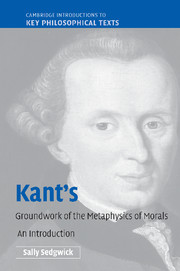Book contents
- Frontmatter
- Contents
- Preface
- List of abbreviations
- 1 Introduction
- 2 Kant's Preface
- 3 Section I: Transition from common rational to philosophic moral cognition
- 4 Section II: Transition from popular moral philosophy to metaphysics of morals
- 5 Section III: Transition from metaphysics of morals to the critique of pure practical reason
- Bibliography
- Index
1 - Introduction
Published online by Cambridge University Press: 05 June 2012
- Frontmatter
- Contents
- Preface
- List of abbreviations
- 1 Introduction
- 2 Kant's Preface
- 3 Section I: Transition from common rational to philosophic moral cognition
- 4 Section II: Transition from popular moral philosophy to metaphysics of morals
- 5 Section III: Transition from metaphysics of morals to the critique of pure practical reason
- Bibliography
- Index
Summary
KANT'S LIFE: A BRIEF BIOGRAPHICAL SKETCH
Immanuel Kant was born on April 22, 1724 in Königsberg (now Kaliningrad), a major trading port on the Baltic Sea in what was then East Prussia. He was the fourth of nine children of a master harness-maker. His parents were devout observers of the Protestant sect known as Pietism. Although his mother died when he was only thirteen, she had a profound impact on his life. She recognized his special gifts early on and encouraged their development. As Kant wrote in a letter, she “awakened and broadened” his ideas, and “implanted and nurtured” in him the “first seed of the good.”
From the age of eight to sixteen years Kant attended the Collegium Fridericianum, a Pietist school dedicated to the instruction of mathematics, history, geometry, and, above all, Latin. Although he enjoyed studying Latin as well as Greek at the Collegium, he described his experience there as that of “youthful slavery.” The school imposed upon its students a particularly zealous form of Pietism, and Kant resisted its insistence upon public displays of devotion. Already as a boy, he was drawn to the ideals of tolerance and freedom of conscience.
In 1740, the year Frederick the Great ascended the throne of Prussia, Kant matriculated at the University of Königsberg. Although his family was of modest means, he avoided pre-professional subjects such as law, medicine, and theology.
- Type
- Chapter
- Information
- Kant's Groundwork of the Metaphysics of MoralsAn Introduction, pp. 1 - 28Publisher: Cambridge University PressPrint publication year: 2008

